▨ CLIENT: North East & Yorkshire Energy Hub / York & North Yorkshire Local Enterprise Partnership
▤ KEY MATERIALS: Timber / Hemp / Straw
▦ METHODOLOGY: Mapping / Cost and carbon analysis / Interviews / Literature review
▥ COLLABORATORS: Arup / Stockdale
This report examines the potential positive impacts of a bioregional construction economy, from improvements in biodiversity to an increase in construction jobs and security; building a case for redistributing the values of the construction industry towards a cleaner, sustainable methodology for growth that is beneficial to all. The report can be viewed here.
Until recently, little attention has been paid to the carbon impacts of the construction and refurbishing of buildings, with the majority of focus on their operational performance. Substituting carbon intensive technical materials with regenerative resources and materials from the biosphere, which absorb and store natural carbon, could have a significant impact on both the carbon footprint and economy of the UK.
The built environment is responsible for almost 40% of global energy-related carbon emissions. If we intend to halt the progress of the climate and ecological breakdown, we must find new ways to design and to build.
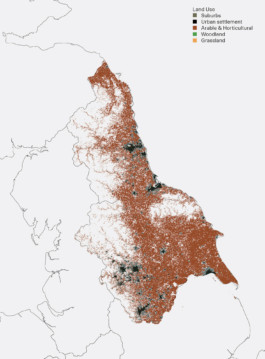
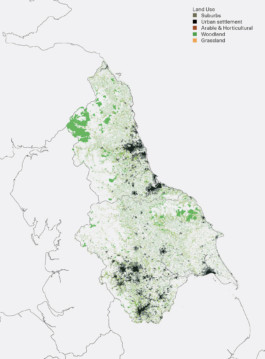
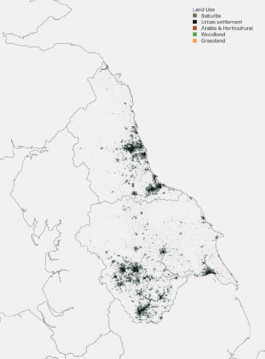
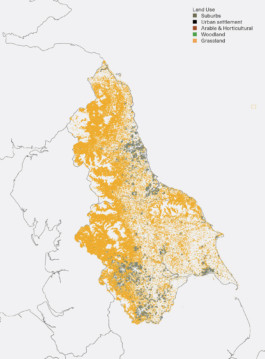
Arable land in the NEY
Woodland in the NEY
Settlement in the NEY
Grassland in the NEY
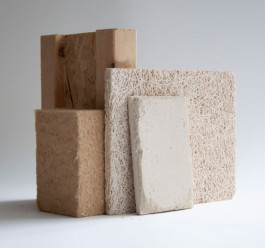
The North East and Yorkshire region is well positioned to lead the UK in this shift as it has much of the existing agricultural and industrial infrastructure required to make the change from carbon-intensive to biobased construction. To meet the growing housing need within the NEY region, over 500,000 new homes need to be built and 2.8 million homes retrofitted over the next 15 years.
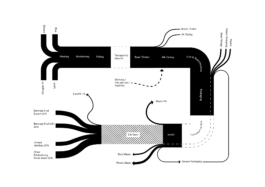
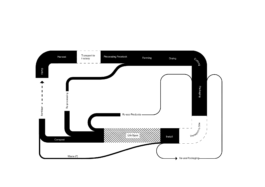
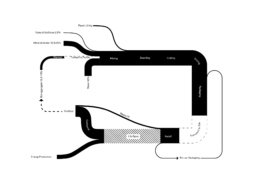
Timber supply chain
Hemp batt supply chain
Hemp-lime board supply chain
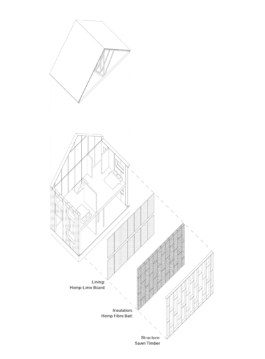
Building these new homes with biobased materials could save up to 2.88 megatonnes of CO2. A shift from current supply chains and methods to regionally grown and processed biobased construction in the delivery of these homes could generate up to £1.9 billion, with the gross value added to the economy reaching a potential £14.8 billion.
This report examines the potential positive impacts of a bioregional construction economy, from improvements in biodiversity to an increase in construction jobs and security; building a case for redistributing the values of the construction industry towards a cleaner, sustainable methodology for growth that is beneficial to all. It can be viewed here.




Arable land in the NEY
Woodland in the NEY
Settlement in the NEY
Grassland in the NEY
Until recently, little attention has been paid to the carbon impacts of the construction and refurbishing of buildings, with the majority of focus on their operational performance. Substituting carbon intensive technical materials with regenerative resources and materials from the biosphere, which absorb and store natural carbon, could have a significant impact on both the carbon footprint and economy of the UK.

The built environment is responsible for almost 40% of global energy-related carbon emissions. If we intend to halt the progress of the climate and ecological breakdown, we must find new ways to design and to build.



Timber supply chain
Hemp batt supply chain
Hemp-lime board supply chain
The North East and Yorkshire region is well positioned to lead the UK in this shift as it has much of the existing agricultural and industrial infrastructure required to make the change from carbon-intensive to biobased construction. To meet the growing housing need within the NEY region, over 500,000 new homes need to be built and 2.8 million homes retrofitted over the next 15 years.

Building these new homes with biobased materials could save up to 2.88 megatonnes of CO2. A shift from current supply chains and methods to regionally grown and processed biobased construction in the delivery of these homes could generate up to £1.9 billion, with the gross value added to the economy reaching a potential £14.8 billion.
E info@materialcultures.org
T 07707592097
E info@materialcultures.org
T 02030626832